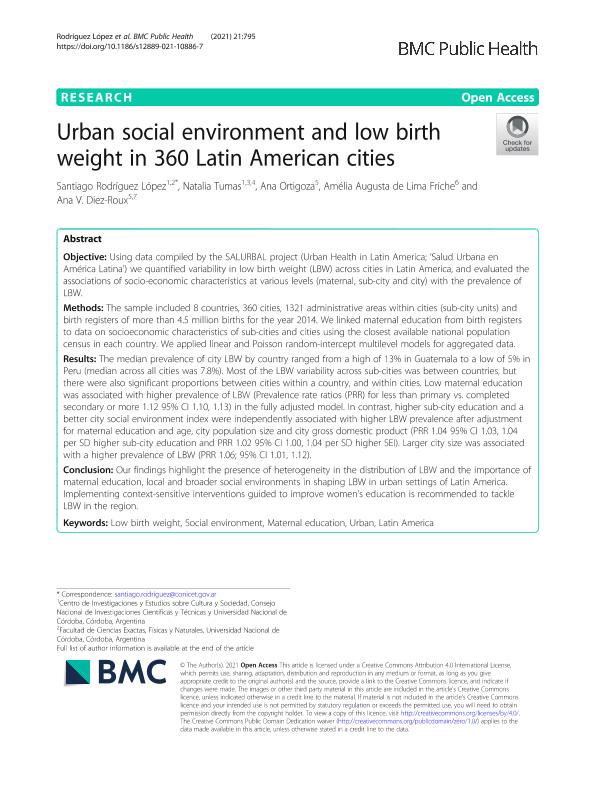Mostrar el registro sencillo del ítem
dc.contributor.author
Rodríguez López, Santiago

dc.contributor.author
Tumas, Natalia

dc.contributor.author
Ortigoza, Ana
dc.contributor.author
Lima Friche, Amélia Augusta de
dc.contributor.author
Diez Roux, Ana Victoria

dc.date.available
2022-10-04T20:13:34Z
dc.date.issued
2021-12
dc.identifier.citation
Rodríguez López, Santiago; Tumas, Natalia; Ortigoza, Ana; Lima Friche, Amélia Augusta de; Diez Roux, Ana Victoria; Urban social environment and low birth weight in 360 Latin American cities; BioMed Central; BMC Public Health; 21; 1; 12-2021; 1-10
dc.identifier.uri
http://hdl.handle.net/11336/171841
dc.description.abstract
Objective: Using data compiled by the SALURBAL project (Urban Health in Latin America; ‘Salud Urbana en América Latina’) we quantified variability in low birth weight (LBW) across cities in Latin America, and evaluated the associations of socio-economic characteristics at various levels (maternal, sub-city and city) with the prevalence of LBW. Methods: The sample included 8 countries, 360 cities, 1321 administrative areas within cities (sub-city units) and birth registers of more than 4.5 million births for the year 2014. We linked maternal education from birth registers to data on socioeconomic characteristics of sub-cities and cities using the closest available national population census in each country. We applied linear and Poisson random-intercept multilevel models for aggregated data. Results: The median prevalence of city LBW by country ranged from a high of 13% in Guatemala to a low of 5% in Peru (median across all cities was 7.8%). Most of the LBW variability across sub-cities was between countries, but there were also significant proportions between cities within a country, and within cities. Low maternal education was associated with higher prevalence of LBW (Prevalence rate ratios (PRR) for less than primary vs. completed secondary or more 1.12 95% CI 1.10, 1.13) in the fully adjusted model. In contrast, higher sub-city education and a better city social environment index were independently associated with higher LBW prevalence after adjustment for maternal education and age, city population size and city gross domestic product (PRR 1.04 95% CI 1.03, 1.04 per SD higher sub-city education and PRR 1.02 95% CI 1.00, 1.04 per SD higher SEI). Larger city size was associated with a higher prevalence of LBW (PRR 1.06; 95% CI 1.01, 1.12). Conclusion: Our findings highlight the presence of heterogeneity in the distribution of LBW and the importance of maternal education, local and broader social environments in shaping LBW in urban settings of Latin America. Implementing context-sensitive interventions guided to improve women’s education is recommended to tackle LBW in the region.
dc.format
application/pdf
dc.language.iso
eng
dc.publisher
BioMed Central

dc.rights
info:eu-repo/semantics/openAccess
dc.rights.uri
https://creativecommons.org/licenses/by/2.5/ar/
dc.subject
LATIN AMERICA
dc.subject
LOW BIRTH WEIGHT
dc.subject
MATERNAL EDUCATION
dc.subject
SOCIAL ENVIRONMENT
dc.subject
URBAN
dc.subject.classification
Salud Pública y Medioambiental

dc.subject.classification
Ciencias de la Salud

dc.subject.classification
CIENCIAS MÉDICAS Y DE LA SALUD

dc.title
Urban social environment and low birth weight in 360 Latin American cities
dc.type
info:eu-repo/semantics/article
dc.type
info:ar-repo/semantics/artículo
dc.type
info:eu-repo/semantics/publishedVersion
dc.date.updated
2022-08-09T11:39:13Z
dc.identifier.eissn
1471-2458
dc.journal.volume
21
dc.journal.number
1
dc.journal.pagination
1-10
dc.journal.pais
Reino Unido

dc.journal.ciudad
Londres
dc.description.fil
Fil: Rodríguez López, Santiago. Consejo Nacional de Investigaciones Científicas y Técnicas. Centro Científico Tecnológico Conicet - Córdoba. Centro de Investigaciones y Estudios sobre Cultura y Sociedad. Universidad Nacional de Córdoba. Centro de Investigaciones y Estudios sobre Cultura y Sociedad; Argentina. Universidad Nacional de Córdoba. Facultad de Ciencias Exactas, Físicas y Naturales; Argentina
dc.description.fil
Fil: Tumas, Natalia. Consejo Nacional de Investigaciones Científicas y Técnicas. Centro Científico Tecnológico Conicet - Córdoba. Centro de Investigaciones y Estudios sobre Cultura y Sociedad. Universidad Nacional de Córdoba. Centro de Investigaciones y Estudios sobre Cultura y Sociedad; Argentina. Universidad Católica de Córdoba; Argentina
dc.description.fil
Fil: Ortigoza, Ana. Drexel University; Estados Unidos
dc.description.fil
Fil: Lima Friche, Amélia Augusta de. Universidade Federal de Minas Gerais; Brasil
dc.description.fil
Fil: Diez Roux, Ana Victoria. Drexel University; Estados Unidos
dc.journal.title
BMC Public Health

dc.relation.alternativeid
info:eu-repo/semantics/altIdentifier/doi/http://dx.doi.org/10.1186/s12889-021-10886-7
dc.relation.alternativeid
info:eu-repo/semantics/altIdentifier/url/https://bmcpublichealth.biomedcentral.com/articles/10.1186/s12889-021-10886-7
Archivos asociados
